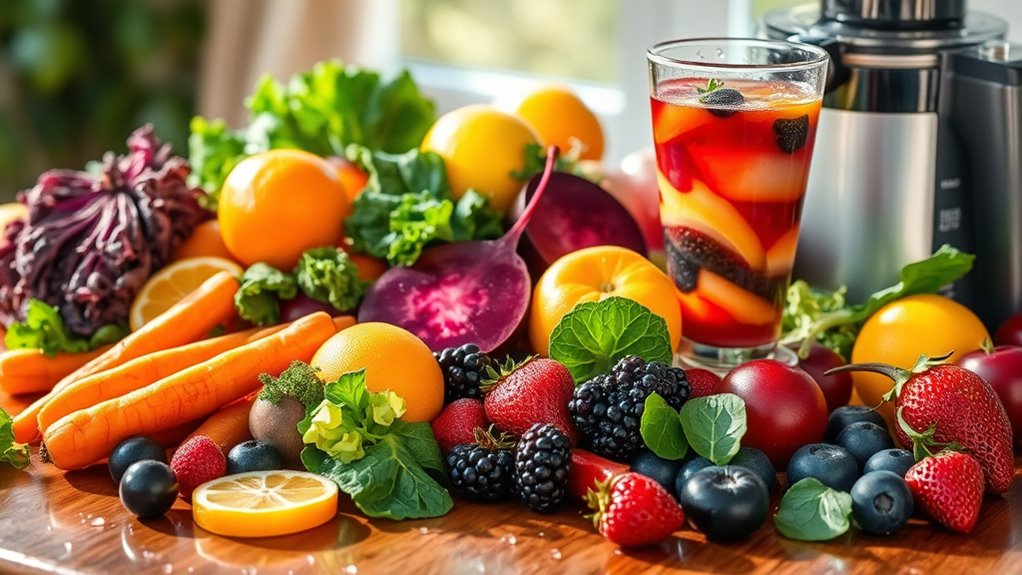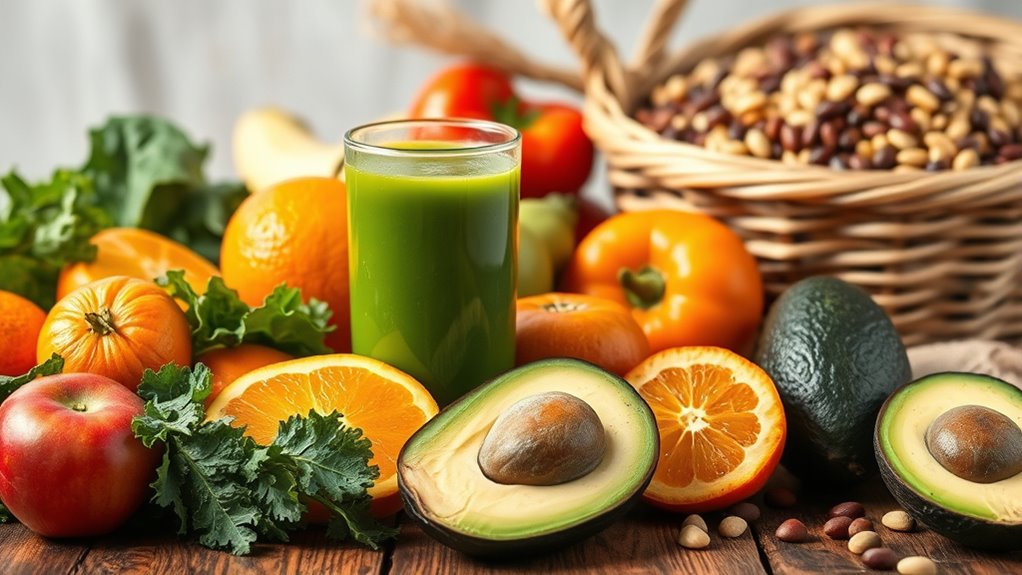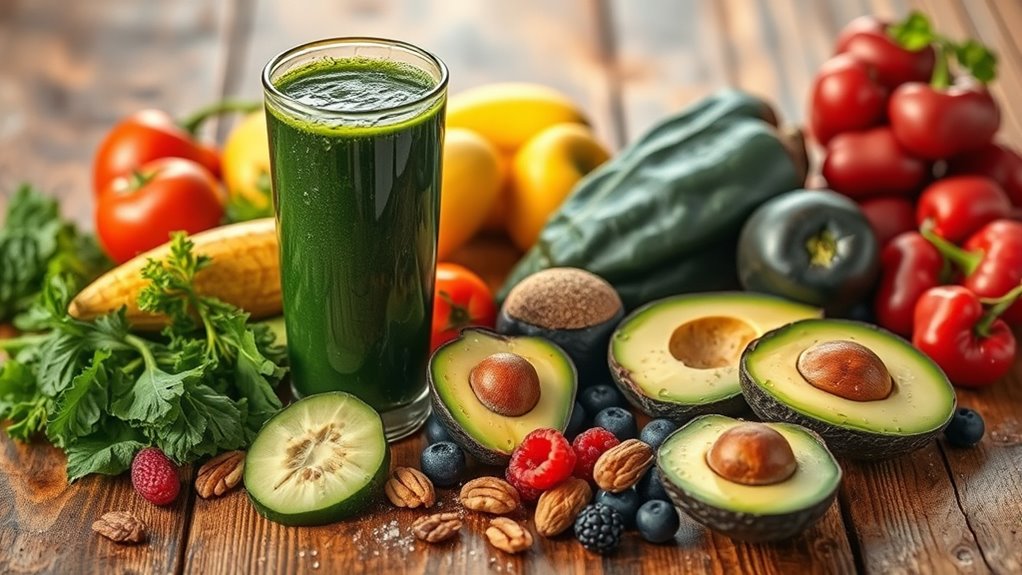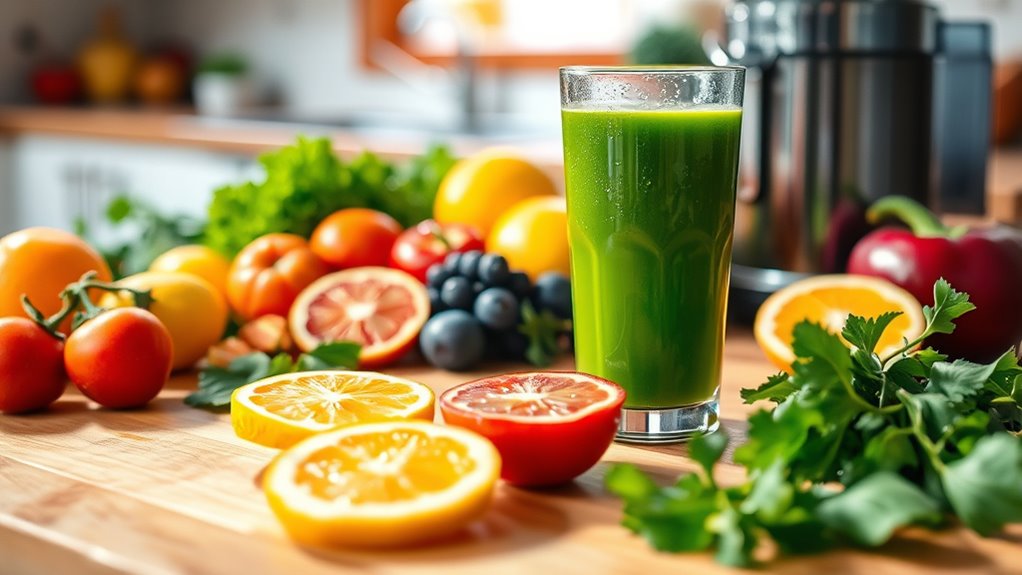Juicing might seem like an easy way to achieve hormonal balance, but it’s more complicated. Juices can boost vitamins and antioxidants, yet they strip away fiber, which is essential for gut health and stable blood sugar levels. While specific juices can aid hormonal health, relying solely on them can result in deficiencies. To truly support your hormones, balance juice with whole foods for a thorough nutritional approach. Find out how you can optimize your diet for better hormonal health.
Key Takeaways
- Juicing can enhance vitamin and antioxidant intake but lacks essential dietary fiber needed for hormonal balance.
- Whole foods provide a broader range of nutrients and up to 90% more fiber than juices.
- Certain juices, like orange and watermelon, can improve insulin sensitivity and reduce inflammation, but should complement whole food diets.
- Relying solely on juice can lead to nutritional deficiencies and increase hunger and cravings due to low fiber content.
- The body detoxifies naturally; juice cleanses do not significantly enhance this process or support hormonal health effectively.
Understanding the Nutritional Value of Juicing

When you consider juicing, it’s important to understand its nutritional value and how it can impact your health.
Juice cleanses can boost your intake of vitamins, minerals, and antioxidants from fruits and vegetables, but they also strip away up to 90% of dietary fiber. This fiber is essential for digestive health and helps maintain stable blood sugar levels.
While drinking juice can offer potential health benefits, relying solely on it can lead to nutritional deficiencies, especially since fruit juices often contain high sugar levels with little fiber.
Instead of focusing exclusively on juices, incorporating whole foods into your diet provides a better balance of nutrients, supporting overall health and hormonal balance effectively.
The Role of Specific Juices in Hormonal Health

Juices play an essential role in supporting hormonal health, especially when you choose the right ones. For instance, orange juice is packed with vitamin C and antioxidants, helping improve insulin sensitivity and regulate blood sugar levels, which benefits your hormonal health.
Lemon juice, with its citric acid, supports liver functions and aids in detoxification, essential for maintaining hormonal balance. Watermelon juice also shines with its high vitamin C content, promoting anti-inflammatory effects and enhancing insulin sensitivity.
Additionally, juices from dark leafy greens are rich in antioxidants that combat oxidative stress, a factor linked to hormonal imbalances. By incorporating these juices into your routine, you can effectively support stable blood sugar levels and promote overall hormonal health. Moreover, maintaining hydration is crucial for optimal hormonal function, as dehydration can lead to imbalances.
The Importance of Fiber in Your Diet

Fiber is an essential component of a healthy diet, playing a notable role in digestive health and overall well-being. It helps regulate your cholesterol levels and can greatly reduce the risk of heart disease.
When you consume enough fiber, you support your gut health, promoting regular bowel movements and preventing digestive issues. A high-fiber diet also helps stabilize blood sugar levels, which is vital if you’re looking to maintain hormonal balance.
Unfortunately, juices often lack the necessary fiber, leaving you feeling hungrier and more prone to cravings. Aim for at least 25 grams per day for women and 38 grams for men, as this can help keep your appetite in check and support a healthy lifestyle. Additionally, incorporating whole grains into your meals can further enhance your fiber intake and overall health.
Balancing Juicing With Whole Foods

To achieve ideal hormonal balance, it’s vital to integrate juicing with whole foods in your diet. While juices can offer a quick dose of nutrients, they often lack the fiber found in whole foods, which is important for digestive health and hormonal regulation.
Whole fruits and vegetables provide up to 90% more fiber, promoting better metabolic processes. Additionally, whole foods contain a broader range of important vitamins and antioxidants that support hormonal balance.
Incorporating healthy fats and proteins alongside your juices can help stabilize blood sugar levels, reducing energy dips and cravings. Regular meals featuring whole foods, rather than extreme juice cleanses, are more effective for maintaining your hormonal health and overall wellness. Including low carb high protein options in your meals can further enhance your energy levels and hormonal stability.
Common Misconceptions About Juice Cleanses

While many people turn to juice cleanses in hopes of achieving hormonal balance, it’s essential to understand that these liquid diets often fall short of providing the necessary nutrients your body needs. Juice cleanses typically lack fiber, which is important for digestion and can lead to nutrient deficiencies. This misconception promotes misinformation, suggesting these cleanses support your body’s detoxification processes. Unfortunately, they don’t address the root causes of hormonal imbalances and can lead to unhealthy eating patterns post-cleanse. Additionally, incorporating unique homemade fruit juice recipes can offer a more balanced approach to nutrition without the drawbacks of a juice cleanse.
| Misconception | Reality | Consequence |
|---|---|---|
| Juice cleanses balance hormones | They lack essential nutrients | Hormonal imbalances persist |
| Juice cleanses detoxify | The body detoxifies naturally | Misunderstanding of detox processes |
| Juice cleanses provide fiber | Juices often omit fiber | Digestive issues arise |
| Juice cleanses are sustainable | They can lead to cravings | Unhealthy eating patterns |
Frequently Asked Questions
Can Juicing Help Balance Hormones?
Juicing alone won’t help balance your hormones. While it may seem like a quick fix, liquid diets often lack essential nutrients, leading to deficiencies that can disrupt hormonal regulation.
Whole foods, rich in healthy fats, proteins, and fiber, provide the necessary support for hormonal health. Instead of relying on juices, focus on a balanced diet and educate yourself about nutrition to effectively promote hormonal balance and overall well-being.
Is Juicing Scientifically Proven?
Juicing isn’t scientifically proven to be effective for balancing hormones. While you might find it invigorating, the lack of essential nutrients in juice cleanses can lead to deficiencies.
Your body needs a variety of whole foods—like proteins, healthy fats, and fiber—to support hormonal health. Instead of relying solely on juices, focus on a balanced diet that nourishes your body and supports its natural processes, ensuring better overall health and hormonal balance.
Which Juice Is Best for Hormonal Imbalance?
When it comes to choosing the best juice for hormonal imbalance, consider citrus juices like orange and lemon for their vitamin C content, which supports adrenal function.
Watermelon juice is great for regulating blood sugar levels, while beet juice can aid liver health and detoxification.
Don’t forget green juices from leafy vegetables—they enhance your nutrient intake.
Just remember, juicing should complement a balanced diet full of whole foods for ideal hormonal health.
What Can I Drink to Balance My Female Hormones?
What if the secret to balancing your female hormones lies in what you drink?
Start your day with warm lemon water to kickstart liver detox.
Try smoothies rich in flaxseed or chia seeds for omega-3s and anti-inflammatory benefits.
Sip on herbal teas like spearmint or chamomile to lower stress and androgens.
Don’t forget pomegranate juice for antioxidants and green vegetable juices for essential nutrients.
Your hormonal harmony might just be a drink away!
Conclusion
Incorporating juicing into your diet can be a powerful tool for hormonal balance, but it shouldn’t replace whole foods. Did you know that a single glass of juice can contain the nutrients of up to three servings of fruits and vegetables? While that’s impressive, remember that fiber is essential for ideal health. So, enjoy your juices, but make sure to balance them with whole foods to truly nourish your body and support your hormones.
Cindy thoroughly researches juicing trends, techniques, and recipes to provide readers with practical advice and inspiration. Her writing style is accessible, engaging, and designed to make complex concepts easy to understand. Cindy’s dedication to promoting the advantages of juicing shines through her work, empowering readers to make positive changes in their lives through the simple act of juicing.











